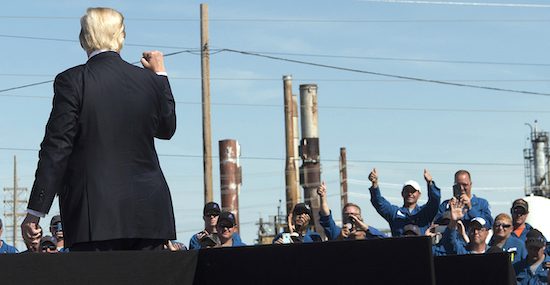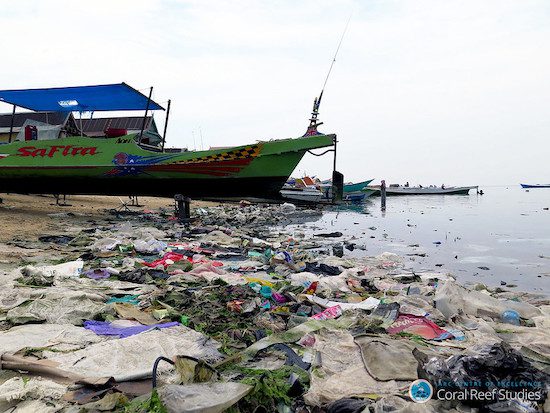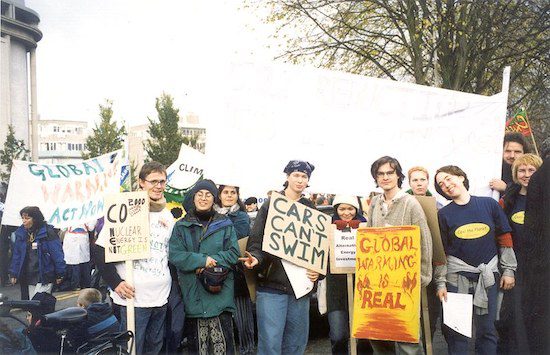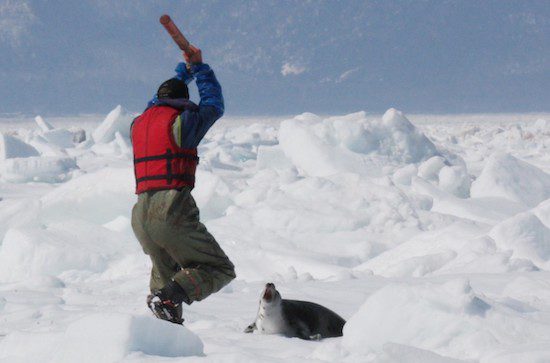


“Revising the 50-year-old law through regulatory reinterpretation is one of the biggest—and most audacious—deregulatory actions of the Trump administration, which to date has moved to roll back 100 rules protecting clean air and water, and others that aim to reduce the threat of human-caused climate change,” writes Lisa Friedman of The New York Times, about Trump’s weakening of the National Environmental Policy Act.
Care2: Since 1970, the National Environmental Protection Act (NEPA) has protected people and the planet by making sure construction companies can’t just willy-nilly build factories, pipelines, major roadways or drilling sites near where people live. Now President Trump has gutted this key conservation law. Under his new, stripped-down version, corporations will no longer need to consider a project’s contribution to climate change. And people who live near proposed sites will have virtually zero chance for input. This is an egregious attempt to take away the rights of the people and expand the already massive power and wealth of the fossil fuel and construction industries, and at a particularly horrible time. Climate change is already a global emergency, with scientists agreeing that if we have not taken enough steps by 2030 to curb the climb of the world’s temperatures, we will be past the point of no return. NEPA was already insufficient for the task at hand, and now we don’t even have its meager protections.
>>>Demand that the Trump Administration restore NEPA.
Rainforest Rescue: The island of Palawan is a UNESCO Man and Biosphere Reserve, a certified ecological and cultural treasure in the Philippines. It is home to numerous endemic and threatened species and the ancestral land of Indigenous peoples who have little contact with the outside world, rich oral traditions and a profound knowledge of nature. They have been living in and with the forest for centuries, harvesting forest products in a sustainable manner and planting small community plots of vegetables and mountain rice. But now, the provincial government wants to open up areas of rich biodiversity and indigenous land to industrial plantations. An industrial coconut grower is already destroying Indigenous peoples’ sacred sites and burial grounds. Tribal leaders who have spoken out against the company have reportedly received death threats. Without international pressure, vast swathes of rainforest and Indigenous land could be replaced by a green desert of coconut plantations.
>>>Urge Palawan Governor Jose Alvarez to stop the plundering of rainforest and tribal land in southern Palawan and say no to monocrop plantations.
Environmental Health Strategy Center: Over a million Big Mac boxes are used and discarded each day. And new test results show that those boxes may be contributing to the PFAS “forever chemicals” pollution crisis. Corporations add PFAS forever chemicals to food packaging to make it grease-resistant. The packaging is used once, but toxic PFAS chemicals last forever in the environment. New testing of paper packaging from top fast-food chains—McDonald’s, Burger King, and Wendy’s—as well as top health-minded chains—Sweetgreen, Cava, and Freshii—found fluorine levels suggesting PFAS treatment in nearly half of the samples. When people eat food from this packaging, they may end up ingesting some of the chemicals too. In the new study, the Big Mac box tested positive as did a McDonald’s fry bag and cookie bag. And if all this McDonald’s packaging used across the country has PFAS, the company could be responsible for a whole lot of forever chemicals going into landfills and incinerators each day. Sweetgreen, whose bowls tested positive in the study, recently announced that it’s phasing out packaging with PFAS by the end of this year. Chipotle, Taco Bell and Panera Bread have announced action on PFAS too. But McDonald’s has failed to.
>>>Urge McDonald’s to commit to a steadfast policy against PFAS.
Cause for concern…

Unless the world acts, more than 1.3 billion metric tons of plastic will be dumped on land and in the oceans over the period from 2016 to 2040, experts warn in a new study. “This scientific inquiry has for the first time given us a comprehensive insight into the staggering amounts of plastic waste being dumped into the world’s terrestrial and aquatic ecosystems,” said lead author Costas Velis of the University of Leeds. “We now have a much clearer picture of the sources of the pollution and where it eventually ends up.”
- A world drowning in plastic pollution (University of Leeds)
- Coastal flooding set to get more frequent, threatening coastal life (University of East Anglia)
- Global warming may unleash Asian monsoon fury (South Asia Monitor)
- Sharks ‘functionally extinct’ on nearly one in five of the reefs surveyed in massive global study (James Cook University)
- Overexploitation causing sharp declines in popular seafood species around the world (University of British Columbia)
- Microplastics have been found in the guts of sea-bed sharks (University of Exeter, Environmental News Network)
- Newer toxic PFAS compound detected for first time in Arctic seawater (American Chemical Society)
- Alaska is getting wetter—that’s bad news for permafrost and the climate (Institute of Arctic and Alpine Research, University of Colorado Boulder)
- Violence against animals in Yucatan increased significantly during the pandemic (The Yucatan Times)
- Wide awake: Light pollution keeps magpies and pigeons tossing and turning (International Dark-Sky Association)
Round of applause…

In one of the few times a court has forced a national government to bolster their climate policy, the Irish Supreme Court ruled that the government’s emission reduction plan fell “well short” of what was required and must be improved. The nation’s Climate Action and Low Carbon Development Act requires an 80% cut to emissions by 2050 compared to 1990 levels.
- Irish government compelled by court to strengthen climate plan (Isabella Kaminski, Climate Home News)
- California may ban African hunting trophies: How Black Lives Matter has altered the debate (Ryan Sabalow, San Luis Obispo Tribune)
- U.S. House adopts amendment for $1.5 million to protect critically endangered right whale (Defenders of Wildlife)
- Shift to vegan food would create 19 million jobs in Latin America and Caribbean (Charlotte Pointing, LIVEKINDLY)
- Wildlife rangers risk their lives every day to stop poachers (Emma Ledger, The Independent)
- COVID has caused the longest and deepest reduction in human noise on record (Gavin Butler, VICE)
- Rock dust could be farming’s next climate solution (Claire Bugos, Smithsonian Magazine)
- Thousands of cockfighting roosters rescued from California ranch (Jon Haworth, ABC News/WBAL Radio)
- Germany plans to dim lights at night to save insects (AFP via MSN)
- Animal rights billboards go up across Los Angeles connecting pandemic to meat eating (MyNewsLA)
- How veganism and other plant-based diets are becoming mainstream (Dai’Tynn Coppage-Walker, Iowa State Daily)
Parting thought…

“Having heard all of this you may choose to look the other way but you can never again say you did not know.” —William Wilberforce
Earth | Food | Life (EFL) explores the critical and often interconnected issues facing the climate/environment, food/agriculture and nature/animal rights, and champions action; specifically, how responsible citizens, voters and consumers can help put society on an ethical path of sustainability that respects the rights of all species who call this planet home. EFL emphasizes the idea that everything is connected, so every decision matters.
Click here to support the work of EFL and the Independent Media Institute.
Questions, comments, suggestions, submissions? Contact EFL editor Reynard Loki at [email protected]. Follow EFL on Twitter @EarthFoodLife.